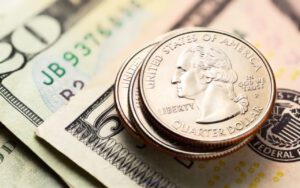
The dollar is slightly falling against the euro and weakly appreciating against the Japanese yen in trading on Tuesday.
The euro/dollar pair was trading at $1.0825 at 8:52 Moscow time, versus $1.0821 at the close of the previous session.
The dollar/yen exchange rate rose 0.07% to 128.66 yen from 128.57 yen at the end of the previous session.
The pound is trading at $1.2195 versus $1.2196 in previous trading.
The index, calculated by ICE, which shows the U.S. dollar trend against six currencies (euro, Swiss franc, yen, Canadian dollar, pound sterling and the Swedish krona), rose 0.18%.
The dollar index is near its lowest level in seven months amid data showing that U.S. inflation slowed in December.
A weakening inflationary pressure in the United States could be the decisive argument for a further slowdown in monetary policy tightening by the Federal Reserve.
Meanwhile, the yuan, which is traded in mainland China, stands at 6.7676/$1 from 6.7336/$1 at the close of the previous session.
China’s economy grew 2.9% year on year in the fourth quarter of 2022, according to data from the State Statistics Office.
Thus, the growth rate slowed significantly from 3.9% in the third quarter.
Analysts on average had expected China’s GDP to rise 1.8% in October-December, Trading Economics reported.

The U.S. dollar is getting cheaper against the euro, the pound sterling and the Japanese yen in trading Tuesday afternoon.
The ICE-calculated index showing the dollar’s dynamics against six currencies (euro, Swiss franc, yen, Canadian dollar, pound sterling and Swedish krona) lost 0.73% in trading, while the broader WSJ Dollar Index lost 0.64%.
The yen was up 3% against the dollar at 132.73 yen/$1 as of 2:10 p.m., compared with 136.91 yen/$1 at Monday’s market close.
The Japanese national currency was actively growing after the Bank of Japan unexpectedly decided to increase the borders of the band within which the yield of ten-year government bonds may fluctuate to plus/minus 0.5% from plus/minus 0.25% at the end of its regular meeting that ended on Tuesday.
According to the regulator, this decision will improve the stability of the existing monetary policy, but many economists took this step as laying the foundation for the exit from the ultra-soft monetary policy (MP), maintained for a long time, writes Bloomberg.
At the same time, the Bank of Japan left the main parameters of MP unchanged: the short-term interest rate on deposits of commercial banks in the Central Bank remained at minus 0.1% per annum, the target yield on ten-year government bonds – about zero. This coincided with the expectations of most analysts.
The euro/dollar pair is trading at $1.0635 compared to $1.0609 at the close of the previous session.
The pound has fallen in price to $1.2148 against $1.2145 at the close of trading on Monday.